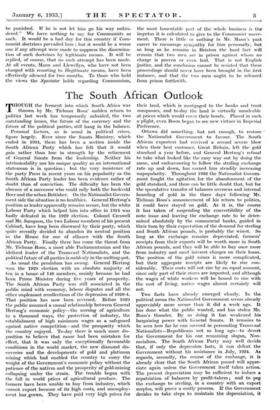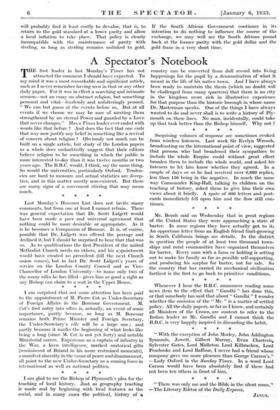The South A frican Outlook THOUGH the ferment into which
South Africa was 1 thrown by Mr. Tielman Roos' sudden return to politics last week has temporarily subsided, the two outstanding issues, the future of the currency and the future of the political parties, still hang in the balance..
Personal factors, as is usual in political crises, figure largely. Ever since the Smuts Ministry, which ended in 1924, there has been a section inside the South African Party which has felt that it would gain rather than lose in strength by the retirement of General Smuts from the leadership. Neither his intrinsicability nor his unique quality as an international statesman is in question ; but the very insistence of the party Press in recent years on his popularity as the South African Party leader has been evidence rather of doubt than of conviction. The difficulty has been the absence of a successor who could rally both the backveld Boer and the urban Britisher. On the Nationalist Govern- ment side the situation is no healthier. General Hertzog's position as leader apparently remains secure, but the white Labour Party which helped him into office in 1924 was badly defeated in the 1929 election. Colonel Creswell and Mr. Sampson, the two Labour members of his present Cabinet, have long been disowned by their party, which quite recently decided to abandon its neutral position in the House for one of alliance with the South African Party. Finally there has come the threat from Mr. Tielmaa Roos, a most able Parliamentarian and the idolized leader of the Transvaal Nationalists, and the political future of all parties is suddcnly in the melting-pot. , As usual the pendulum has swung. General Hertzog won the 1929 election with an absolute majority of ten. in e house. of 148 members, mainly because he had been Prime Minister during five years of prosperity. The South African Party was still associated in the public mind with economy, labour disputes and all the other unpleasant recollections of the depression of 1920-4. That position has now been reversed. Before 1929 the public assumed a causal relationship between General Hertzog's economic policy—the nursing of agriculture in a thousand ways, the protection of industry, the establishment of high minimum wages as a safeguard against native competition—and the prosperity which the country enjoyed. To-day there is much more dis- pbsition to believe that cause had been mistaken for effect, that it was only the exceptionally favourable conditions in the world market, the new diamond dis- coveries and the developments of gold and platinum mining which had enabled the country to carry the weight of the Government's economic policy without the patience of the natives and the prosperity of gold-mining collapsing under the -strain. The trouble began with the fall in world prices of agricultural produce. The farmers have been unable to buy from industry, which cannot export .because of its high costs, and unemploy- ment has..grown. They have paid very high prices for
their land, which is mortgaged to the banks and trust companies, and to-day the land is virtually unsaleable at prices which would cover their bonds. Placed in such a plight, even Boers began to see new virtues in Imperial Preference.
Ottawa did something, but not enough, to restore - the Nationalist Government to favour. The South African exporters had received a second severe blow when their best customer, Great Britain, left the gold standard a year before, and General Hertzog's refusal to take what looked like the easy way out by doing the same, and endeavouring to follow the sterling exchange rate up and down, has earned him steadily increasing unpopularity: Throughout 1982 the Nationalist Govern- ment fought the agitation for the abandonment of the gold standard, and there can be little doubt that, but for the speculative transfer of balances overseas and internal hoarding of gold in the three days following Mr. Tielman Roos's announcement of his return to politics, it could have stayed on gold. As it is, the course it has taken of suspending the convertibility of the note issue and leaving the exchange rate to be deter- mined absolutely by the commercial banks, guided in their turn by their expectation of the demand for sterling and South African pounds, is probably the wisest. So long as the exchange remains depreciated, farmers' receipts from their exports will be worth more in South African pounds, and they will be able to buy once more from industry and meet interest charges on their loans. The position of the gold mines is more complicated, but their aggregate receipts are likely to rise con- siderably. Their costs will not rise by an equal amount, since only part of their stores are imported, and although the wages of white workers will be bound to rise with the cost of living, native wages almost certainly will not.
Two facts have already emerged clearly. In the political arena the Nationalist Government seems already appreciably more secure than it did a week ago. It has done what the public wanted, and has stolen Mr. Roos's thunder. By so doing it has weakened his bargaining power with General Smuts. It remains to be seen how far he can succeed in persuading Transvaal Nationalists—Republicans not so long ago—to desert the Government for his one remaining slogan, Non- racialism. The South African Party may well decide that, if only the depression lasts, it can defeat the Government without his assistance in July, 1934. As regards, secondly, the course of the exchange, it is already clear that the South African pound will appre- ciate again unless the Government itself takes action. The present depreciation may be sufficient to induce a repatriation of balances by profit-takers ; and to peg the exchange to sterling, in a .country with an export surplus, will prove a costly process. If the Government decides to take steps to maintain the depreciation, it
will probably find it least costly to devalue, that is, to return to the gold standard at a lower parity and allow a local inflation to take place. That policy is clearly incompatible with the maintenance of parity with sterling, so long as sterling remains unlinked to gold. If the South African Government continues in its intention to . do nothing to influence the course of the exchange, we may well see the South African pound back at the former parity with the gold dollar and the gold franc in a very short time. -





































 Previous page
Previous page